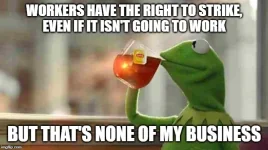Eliminates NLRB-supervised secret ballot elections to unionize.
I don't see anything in the law, as sent to the Senate, which eliminates secret ballots. Hmmmm.
It subjects neutral third parties, who have never signed any agreement with a union, to strikes and secondary boycotts.
I don't see anything about this either in the law. Hmmmm.
That said, I don't see a problem with this. I have no doubt that behind the scenes, companies pressure each other to prevent unionization, and I'm sure that some companies drop a vendor because it turned into a union shop. Fair's fair, no?
Plus, this is America, where people boycott at the drop of a hat. It doesn't usually work, nor do I envision a massive union-sparked nightmare because of it.

It forces employers to hand over employees' personal information to unions.
Sounds good to me.
AFAIK the employer already has the legal power to contact employees to push its anti-union views; it can also block employees from using company email to discuss union business.
Right To Work simply says employers cannot agree to be unions' financial enforcers by agreeing to fire people the union tells them to fire based on non-payment of dues.
Wow. No bias in
that description, I see :roll:
Closed shops -- where every worker is required to be in the union -- were outlawed in 1947. If you're not in the union, and there is a collective bargaining agreement that sets up contracts for all workers, usually the union can require an agency fee in lieu of (and usually less than) union dues. This reduces a potential free-loader problem, where non-union employees benefit from the union without contributing anything to the union.
Right To Work laws basically block the unions from charging those types of fees, or prevent non-contributors from getting fired.
Roughly half of US states do not have Right to Work laws, and oddly enough the sky has not fallen on either of those states.
Anyway. I didn't see anything in the law as passed which eliminated Right to Work laws, not to mention that any attempt to do so would cause a whirlwind of lawsuits. But assuming I missed something, it is obvious that "Right to Work" laws are also "Right to Freeload" laws. I would not support an agency fee that is identical to a union fee, but yeah, if someone is negotiating your contract for you? You should pay up.
By the way, I noticed how you didn't mention other aspects of this law, such as:
• expands unfair labor practices to include prohibitions against replacement of or discrimination against workers who participate in strikes
• makes it an unfair labor practice to require or coerce employees to attend employer meetings designed to discourage union membership
• permits workers to participate in collective or class action litigation
• allows injunctions against employers engaging in unfair labor practices involving discharge or serious economic harm to an employee
• expands penalties for labor law violations, including interference with the National Labor Relations Board or causing serious economic harm to an employee
H.R.2474 - 116th Congress (2019-2020): Protecting the Right to Organize Act of 2019 | Congress.gov | Library of Congress
I wonder why...?

